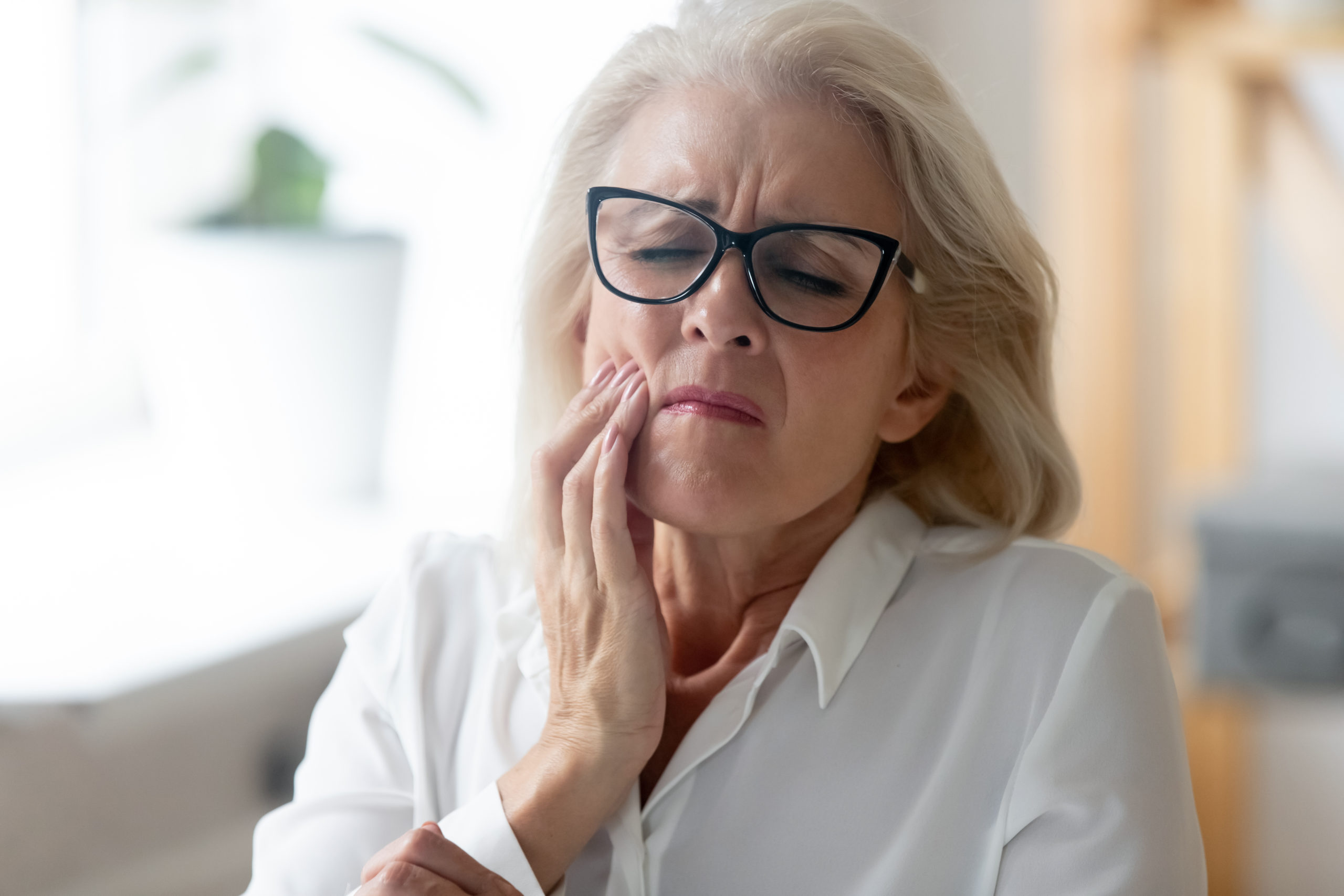What are Pain and Unpleasant Sensations in the Mouth?
The formal name for complaints about pain and unpleasant sensations in the mouth is oral sensory complaints (OSC). OSC in perimenopausal women include dry mouth (called xerostomia ), taste disturbances (called dysgeusia), tingling in the mouth (paraesthesia) and the sensation of burning in the mouth and/or on the tongue (called glossodynia). [7] Not only are these unpleasant on their own, they can increase the chances of experiencing other oral mucosal and dental diseases, such as candidiasis, a fungal infection commonly known as thrush. [8]

Bad Taste in the Mouth [Dysgeusia]
The mechanisms of hormone-related oral symptoms are not fully understood. It is known that there are estrogen receptors in the mucous membranes and salivary glands inside the mouth. Because the microscopic structures of mouth and vaginal tissues is very similar, it has been suggested that symptoms in the mouth might share a common cause with symptoms such as vaginal atrophy. [8]
Vaginal ChangesMenopause Transition & Burning Mouth Syndrome (BMS)
One of the most annoying, and in some cases debilitating, oral sensory complaints as your body transitions to menopause is burning mouth syndrome (BMS), which is defined as a burning sensation in the mouth, lips, or tongue that happens for no apparent medical cause. The pain is often described as burning, tender, tingling, hot, scalding, and/or numb sensations in the moist, inner lining of the mouth and/or lips or on the tongue. While BMS can occur throughout the mouth, the most common locations for the pain are the front two-thirds and tip of the tongue. It can also affect the front and back of the roof of the mouth (your hard and soft palates). [1] [2] [6]
BMS primarily affects menopausal or postmenopausal women. There is no definite cause for BMS, so it is considered idiopathic, or a condition that arises spontaneously. However, both psychological factors and peripheral and central neural pain (neuropathy) appear to be involved. There is no cure for BMS, and treatment focuses on the relief of symptoms and on improving quality of life (QOL). [1] [2]
BMS can be classified into two clinical forms: primary and secondary BMS. Primary BMS has no known cause, although it is thought to come from damage to the underlying nervous system. The diagnosis of primary BMS depends on excluding other medical causes. Secondary BMS has a known cause, such as an infection, or psychological factors. [3] [4]
Menopause Transition Causes of Burning Mouth
While the exact causes for burning mouth syndrome are unknown, BMS cases have been linked to:
- Menopause or other hormonal changes
- Nerve damage
- A dental procedure
- Nutritional deficiencies including iron, zinc, or some B vitamins
- Certain medicines used to treat high blood pressure (such as ACE inhibitors)
- Extreme allergic reactions
- Any health conditions that change or impact taste buds or saliva production
- Oral yeast infection (thrush)
- Anxiety and/or depression
Many times, more than one cause is present.
Self-care & Natural Remedies for Burning Tongue
Most cases of BMS improve on their own. There are natural remedies for burning tongue in menopause, as well as at home treatment for your BMS. These can include any or all of the following:
- Sucking on ice chips.
- Drinking plenty of liquids.
- Avoiding hot and spicy foods.
- Avoiding foods and drinks that are high in acid, like citrus fruit, soda, and coffee.
- Avoiding alcohol and tobacco products.
- Trying a new brand of toothpaste.
- Products to produce saliva and relieve dry mouth
- Vitamin supplements including iron, zinc, or vitamin B.
- Pain-relieving ointments. [6]

Therapy and Treatment for Dry Mouth, Burning Mouth and other Oral Issues
At age 40 find a reliable, educated primary care provider familiar with recognizing and treating symptoms of perimenopause and menopause. The North American Menopause Society provides a list of menopause practitioners here.
Treating dry mouth and other unpleasant sensations starts with a process of elimination to rule out any possible secondary causes. For example, low vitamin and mineral levels are associated with BMS, so vitamin supplements can be effective for treatment if that is the cause. When symptoms continue after trying all the self-care possibilities, your healthcare provider will likely start a course of drug treatment.
Although the underlying mechanisms of pain and unpleasant sensations in your mouth are unclear, randomized controlled clinical trials have shown that drug therapy with the following medications may provide relief of oral burning or pain symptom:
- Capsaicin – this is the active ingredient in chili peppers. When used in a cream or patch it can provide pain relief because it helps to block pain messages to your nerves.
- Alpha-lipoic acid – this is an organic compound with known antioxidant properties. Antioxidants protect your cells from free radicals, which are unstable molecules created during normal metabolic processes. Alpha-lipoic acid has been linked to improved nerve function, although properly designed studies are lacking.
- Clonazepam – this is an anticonvulsant or antiepileptic drug that belongs in the benzodiazepine family. Benzodiazepines are tranquilizers.
- Antidepressants or anxiety medications including serotonin and serotonin-noradrenalin reuptake inhibitors are possible treatments. Their effectiveness is currently being evaluated in research studies.
[2] [3] [4] [5]
Additionally, psychotherapy (including cognitive behavioural therapy) and biofeedback have also shown some levels of effectiveness for some individuals.
Hormonal fluctuations are considered to be a possible cause of pain and unpleasant sensations in the mouth, but hormone replacement therapy (with estrogen) use does not necessarily prevent or help women with oral symptoms. Properly controlled long-term randomized studies are needed to assess the effect of HRT on oral discomfort. Future gene profiling could identify women who may or may not benefit from HRT with regard to oral symptoms.[8]

The Science
The cause of mouth pain and unpleasant sensations is not clearly understood, so the scientific evidence showing why and how these symptoms occur is small. However, it is highly likely that there is a hormonal component because these issues are most commonly seen in peri- and -post menopausal women, with one study finding mouth symptoms, including BMS, in 18-33% of post-menopausal women. [8]
What is known is that women with mouth pain and unpleasant sensations (i) have a significantly higher number of menopausal transition symptoms, (ii) have lower saliva volumes and (iii) are taking significantly more medications than women who did not have any mouth pain or unpleasant sensations.
As well, women with taste disturbances and burning mouth syndrome had a significantly lower Tongue Coating Index (TCI) than those who did not. The tongue coating index measures the presence of a white coating on the tongue that is caused by the accumulation of bacteria, food matter and dead cells on the surface of the tongue. This low TCI score means that women with mouth pain and unpleasant sensations either have damaged tongue papillae (the little bumps on your tongue that contain your taste buds and temperature sensors) so no coating can develop. In this case, the damage to the papillae could be the direct cause of the burning and unpleasant sensations. The other possibility is that these women brush and clean their tongue more regularly and so have a lower TCI score. This is a possible response to the pain and unpleasant sensations – women who have them try to self-treat by brushing and cleaning their tongues. Further investigation is underway. [7]
Myths & Mysteries
MYSTERY
Sometimes yes. Sometimes no. Dry mouth (xerostomia), tingling in the mouth (paraesthesia), taste disturbances (called dysgeusia), and burning mouth and/or tongue (glossodynia) can occur at the same time or can occur individually.
MYSTERY
There is no clear answer to this question. It is likely that hormone fluctuations are involved because the problem happens most frequently in peri- and post-menopausal women but there have been no conclusive studies that support this hypothesis. To get a diagnosis of primary Burning Mouth Syndrome all other factors must be ruled out. The label of ‘primary’ means that no cause can be found.
Compiled References
[1] Feller L, Fourie J, Bouckaert M, Khammissa RAG, Ballyram R, Lemmer J. Burning Mouth Syndrome: Aetiopathogenesis and Principles of Management. Pain Res Manag. 2017;2017:1926269. doi: 10.1155/2017/1926269. Epub 2017 Oct 18. PMID: 29180911; PMCID: PMC5664327.
[2] Dahiya, P., Kamal, R., Kumar, M., Niti, Gupta, R., & Chaudhary, K. (2013). Burning mouth syndrome and menopause. International journal of preventive medicine, 4(1), 15–20.
[3] Sun A, Wu KM, Wang YP, Lin HP, Chen HM, Chiang CP. Burning mouth syndrome: a review and update. J Oral Pathol Med. 2013 Oct;42(9):649-55. doi: 10.1111/jop.12101. Epub 2013 Jun 16. PMID: 23772971.
[4] Teruel A, Patel S. Burning mouth syndrome: a review of etiology, diagnosis, and management. Gen Dent. 2019 Mar-Apr;67(2):24-29. PMID: 30875303.
[5] Moghadam-Kia S, Fazel N. A diagnostic and therapeutic approach to primary burning mouth syndrome. Clin Dermatol. 2017 Sep-Oct;35(5):453-460. doi: 10.1016/j.clindermatol.2017.06.006. Epub 2017 Jun 24. PMID: 28916026.
[6] https://familydoctor.org/condition/burning-mouth-syndrome/
[7] Taga, T., Ito, K., Takamatsu, K. et al. Menopausal symptoms are associated with oral sensory complaints in perimenopausal women: an observational study. BMC Women’s Health 21, 262 (2021). https://doi.org/10.1186/s12905-021-01401-6
[8] Meurman JH, Tarkkila L, Tiitinen A. The menopause and oral health. Maturitas. 2009;63(1):56–62.
[9] Vaidya R. (2012). Burning mouth syndrome at menopause: Elusive etiology. Journal of mid-life health, 3(1), 3–4. https://doi.org/10.4103/0976-7800.98809
Original content, last updated February 22, 2023.
© 2025 Herstasis® Health Foundation


